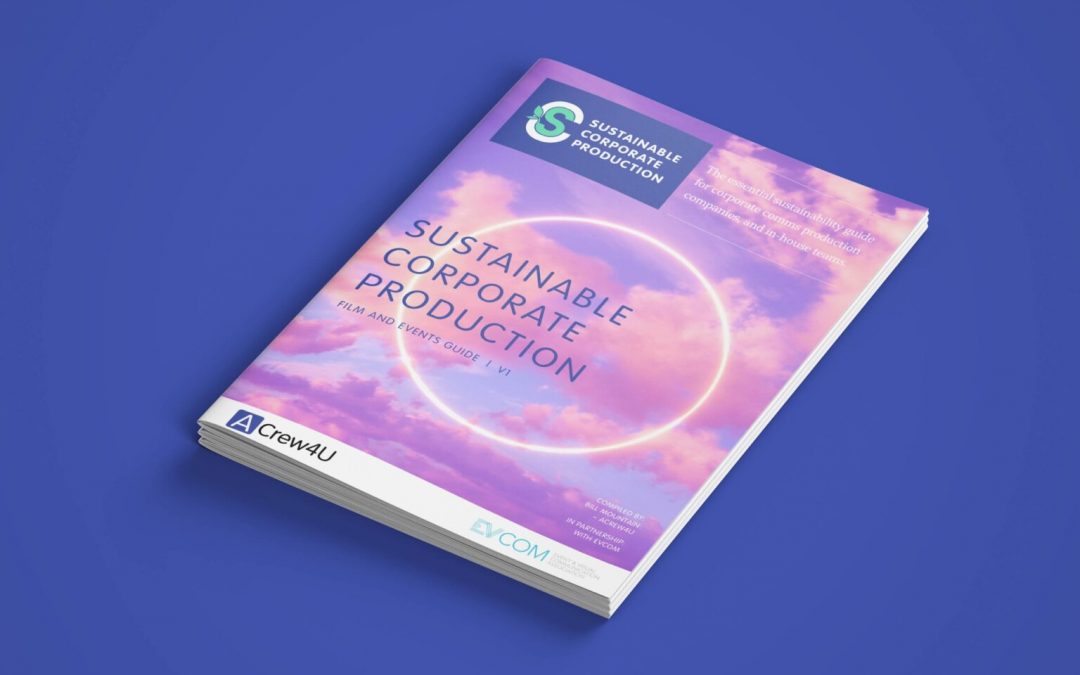Creating a sustainable film and events industry in a time of increasing pressure on the environment is now an essential obligation rather than a ‘nice to do’. More and more clients, aware of their brand profile and their own need to make a difference, are questioning their suppliers and providers as to their sustainability credentials. Production companies will be required to demonstrate and back up their claims of sustainable practices if they are to continue working with ethical brands.
But when time, budgets and resources are limited, ensuring you find the most sustainable way to operate can be tricky.
To help you succeed ACrew4U have produced a handy, and FREE to access guide in collaboration with EVCOM that provides ‘how to’s’, workbooks, case studies, further reading and training modules.
We interviewed Bill Mountain, Managing Director of ACrew4U, about why he created this guide, why he has made it available to be industry and the importance of knowledge-sharing and demystification.
You provide crew all over the world. Can you tell us a bit about your own business, and how it led you to a passion for sustainability and an awareness that something needed to change?
ACrew4U came about as an extension of being a location services company in Paris in the late noughties. Clients who asked for a camera op in Paris started asking me for people in other countries, and what was ScreenParis evolved into today’s firm.
We have been doing remote production in one form or another since 2003, and the firm was doing things in the way that has become accepted from the outset, just due to circumstance. At the time, sustainability didn’t come into it, but as the subject moved up the agenda, we realised that our no/low travel production model was made for the times.
What inspired you to begin this project? Why is it so important for the industry?
It started out as an internal project to research the opportunities afforded by sustainability to the firm. It seemed a shame to keep the findings to ourselves as we felt that our clients and the wider community could benefit from a guide for the uninitiated.
There’s a lot of discourse around sustainability but a real focus of this guide is moving beyond discussion to implementation, taking sustainability from the abstract to the physical. Can you talk about the importance of shifting the industry from conversation into action?
Last year, I started reading the FT and there is no end of coverage of this fund and that fund investing in sustainable projects. This was a nice change from simplistic good/bad articles you tend to see elsewhere. I thought it was time to follow the money and help small businesses like my own understand sustainability.
Be it from getting onto supplier lists of firms that need to report their emissions, helping people understand how they could tread more softly when producing from an environmental perspective, and looking at it all from a business efficiency point of view.
This guide is full of case studies and advice shared by experts and people within the industry, and it is available free of charge. This feels like community knowledge-sharing at its finest. Why was it important to make this guide free and accessible?
It seemed a pity to learn so much about a topic and not share the things I found out. Also, the people that I asked for advice were so helpful and generous with their knowledge that the case studies developed into a big part of the guide organically.
In a space full of accreditations made out of different strings of numbers, another thing you were keen to achieve, was creating a substantial resource on sustainability that wasn’t too overwhelming or academic. Why was that a focus of yours?
I have to research lots of stuff for work, be it crew and production, software, marketing and business processes or actual locations or content for a project. So demystifying stuff is quite a large part of my job. I hope the guide helps do that for the reader…
Who do you think are really getting it right? Who should the rest of the industry be keeping an eye on?
Within EVCOM, people like Jenny Manby at Plastic Pictures on the film side, DRPG in film and events, and Pure Communications and Shelton Fleming in the events world stand out. Though I’m sure there are lots of other people doing great work in this area.
What has your own biggest takeaway been from creating this body of work? Have you learnt anything along the way that you’d like to share?
What stood out for me is how very generous and helpful people with expertise of this subject are with their time and knowledge, it was a very pleasant surprise.
Also, there are real opportunities to build business as well as benefitting the environment for firms that get ahead on this topic.
Lastly, I have learnt that we have tons to do in my firm to be more sustainable, and help our clients be more so. Lots of things have been added to my to-do list!


